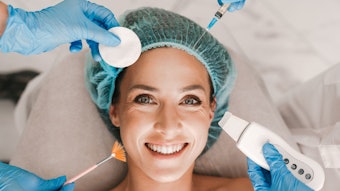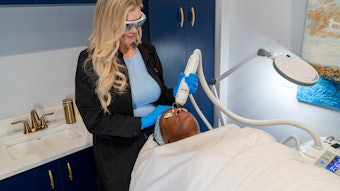
Sexual wellness continues to grow and find a spot in mainstream conversation. Since both men and women are now looking to medical aesthetics to improve their sexual well-being, research is ramping up on the motivations and effectiveness of these treatments. The market is evolving to become more diverse, individualized and accessible.
Related: 5 Exciting Advances in Women's Sexual Wellness Treatments [Survey Results]
Market Growth
Statista reports that the sexual wellness global market was valued at $37.19 billion in 2023. According to WGSN's "Key Trend 2024: The Beauty of Sex," retailers are driving growth globally, with big box stores all now stocking sexual wellness products. Online sex shop Lovehoney also opened a store in the metaverse, per the report. The U.S., U.K. and EU are key regions for the market, while the APAC region is displaying strong growth and there is an emerging consumer base in Africa and Latin America.
WGSN reports that women remain the key consumer in sexual wellness, although the industry is gaining interest from men. Younger millennials and Gen Z help drive the market with some rising interest from older generations. Products that support mental and physical well-being will be in demand. The report projects emotional resilience to be embedded in beauty routines and that sex and pleasure will be accepted as everyday self-care.
While sexual wellness is becoming more accepted, there is an indication of a shift from sex positivity to sex sensitivity among Gen Z, who is reportedly having less sex than previous generations. Their changing habits suggest that meaningful connections will be prioritized over physical sex. Brands can appeal to the younger generation by promoting products that encourage intimacy and safe conversations among partners.
Vaginal Health
McKinsey & Company's Future of Wellness survey indicates that consumers continue to engage with offerings across the women’s health space, including menstrual and intimate care, fertility support, pregnancy and motherhood products and women-focused healthcare centers. In 2023, consumers spent the most on menopause and pregnancy-related products within the sexual health category. Digital tools are also becoming more prevalent in the women’s health landscape and menopause has been a particularly overlooked segment of the market, per the report.
Most women go through menopause in their 40s or 50s. But that can vary widely. According to data from The Mayo Clinic, the average age for menopause in the United States is 51 years old. Some women may experience symptoms earlier if they’ve had surgery to remove their uterus or ovaries or are undergoing specific treatments for cancer, according to Persons Plastic Surgery.
The Menopause Makeover is one option designed for women who are frustrated by the changes to their body during and after menopause, including increased fat in the midsection. Suzanne A. Trott, M.D., FACS a plastic surgeon in Beverly Hills, CA, designed a Menopause Makeover plan that uses liposculpture of the abdomen and flanks (lower back) and sometimes upper back to recreate a long, lean waist for a more youthful shape.
The "Mommy Makeover" is another popular treatment trend in women's health. The series of procedures helps restore the appearance of the abdomen and breasts post-childbirth and can also include liposuction or intimate rejuvenation when indicated.
The Mommy Makeover can involve some fairly major surgery that is accompanied by significant recovery time, according to Darren Smith, M.D., FACS, a board-certified plastic surgeon who offers a "Modern Mommy Makeover" with minimally invasive approaches that minimize discomfort and recovery time. Dr. Smith detailed the Modern Mommy Makeover for MedEsthetics back in March.
More: 3 Trends in Women's Sexual Health in 2023
While these treatments are focused on a specific health experience, Ina Labs offers products aimed at everyday vaginal health. The intimate care company was founded by Beri Ridgeway, M.D., an obstetrician-gynecologist, and Susan Goldsberry, a cosmetics and skin care formulator. The brand is geared towards women, especially mature women, who want gentle products for the vulva. The flagship products are a cleanser, balm, oil elixir, hydrating serum and anti-chafe Photo courtesy of Ina Labs
Photo courtesy of Ina Labs
Goldsberry told Forbes that while tending to her elderly mother, she realized that there are few products on the market for women older than 55 years old who deal with vaginal dryness caused by reduced estrogen levels.
Vulvovaginal dryness can start to occur in perimenopause, during menopause or post-menopause, according to Dr. Ridgeway. With less estrogen, the skin in the vulva region can tighten, leading to painful sex, general irritation and overall dryness. Ridgeway told Forbes the second most common issue is excess moisture in the vulva, which can lead to infection or a bacterial imbalance.
Prostate Cancer
A February 2024 study determined that a plant-based diet can offer improved urinary health, hormonal health and quality of life factors in prostate cancer survivors. Researchers say eating high amounts of plant-based food was linked to better sexual health, urinary health and vitality scores, regardless of demographic factors, lifestyle differences or medical history.
The study, "Plant-based diet associated with better quality of life in prostate cancer survivors," was published in the online journal Cancer. It is believed to be the first of its kind to show better urinary health in these patients based on nutrition, according to study lead author and urologist Stacy Loeb, M.D.
Prostate cancer is among the most common and deadliest forms of cancer among American men, according to the U.S. Centers for Disease Control and Prevention. Researchers are aiming to not only improve quality of life but also find ways to prevent the disease. A March 2022 study by the same team determined that eating a plant-based diet may reduce the risk of developing prostate cancer, building off a 2022 study reviewing the effects a plant-based diet can have on prostate cancer. Other studies have connected plant-based diets to a lower risk of sexual dysfunction in general, but not specifically in prostate cancer survivors.
Sorting patients into five groups (quintiles) based on the proportion of plant versus animal foods eaten, the study found that the quintile that consumed the most plants scored 8% to 11% better in measures of sexual function compared with the group that consumed the least. Similarly, the results revealed up to 14% better scores for urinary health, with fewer instances of incontinence, obstruction and irritation. Hormonal health scores improved by 13% hormonal health, which assesses symptoms like low energy, depression and hot flashes.
Related: Skin Cancer Innovations: New Detection Device & Possible Vaccine for Melanoma
The team analyzed data from the Health Professionals Follow-Up Study, an ongoing investigation that started in 1986 and is sponsored by Harvard Chan School. The data set is composed of information on more than 50,000 male dentists, pharmacists, optometrists, osteopaths, podiatrists and veterinarians. The project was designed to increase understanding of nutrition's influence on risks related to cancer, heart disease and other serious illnesses.
As part of the project, men with prostate cancer answered a questionnaire every four years about the kinds of foods they ate and in what proportions. Another survey, which was administered every two years, assessed the frequency of incontinence, difficulties maintaining an erection and problems with bowels, energy and mood, among many other health concerns.
More than 83% of patients in the ongoing study had received prostate cancer treatments and all included in the study had early forms of the disease that had not yet spread to other organs, according to Loeb.
Among the findings, eating high amounts of plant-based food was linked to better sexual health, urinary health and vitality scores, regardless of demographic factors, lifestyle differences or history of other medical issues such as diabetes. Eating healthy plant-based food was associated with better bowel function, sexual health, urinary health and vitality scores, regardless of demographic factors, lifestyle differences or medical history.
Dr. Loeb cautions however that the men assessed in the study were mostly White healthcare professionals and the team next plans to expand their research to a more diverse group of patients, including patients with more advanced stages of the disease.
Penile Enhancements
A 2022 study in the Aesthetic Surgery Journal analyzed online questionnaires filled out by men seeking to undergo a penile girth augmentation. The survey aimed to assess patients' motivations, including penile size self-discrepancy, psychological distress, self-esteem, body image-related quality of life, body dysmorphic disorder (BDD) and cosmetic procedure screening scale-penile-focused dysmorphic disorder.
Related: 5 Insights Into the Latest Men's Sexual Wellness Trends [Survey Results]
In this study, self-confidence was the most commonly reported motivation for men seeking penile girth augmentation. Other motivations included a desire to change penile size/appearance, sexual function/pleasure, feelings of insecurity and medical issues. The men perceived their actual penis size as significantly smaller than the ideal size and smaller than the size they believed their penis should be, influencing their expected size post-augmentation.
The study suggests that men undergoing these procedures may be underestimating their penile sizes and overestimating those of other men, displaying attitudes that are influenced by pornography and societal stereotypes, a phenomenon supported by previous research.
Penile enhancements involve injecting hyaluronic acid dermal fillers into the penile shaft and glans to increase the penis’ width and add a small amount of length. The procedures are increasingly popular with men who are looking for a change to their sex life. The treatment requires multiple sessions and can cost around $15,000. Other than some bruising and swelling, the recovery process is predictable and fast, allowing sexual activity to resume within one week after the procedure.
Another popular option for enhanced men's sexual health is penile implant devices placed inside the penis to allow men with erectile dysfunction to get an erection. There are two main types of penile implants, semirigid and inflatable. According to Mayo Clinic, penile implants are typically recommended after other treatments for ED fail. Penile implants can also be used to treat severe cases of a condition that causes scarring inside the penis, leading to curved, painful erections (Peyronie's disease).
Some of the most popular penile implant devices include the Titan inflatable penile implant made with a unique material called Bioflex that is reportedly stronger than silicone and The Genesis malleable penile implant consisting of two firm but flexible rods that are placed into the shaft of the penis. Both the Titan and Genesis penile implants are concealed in the body,











